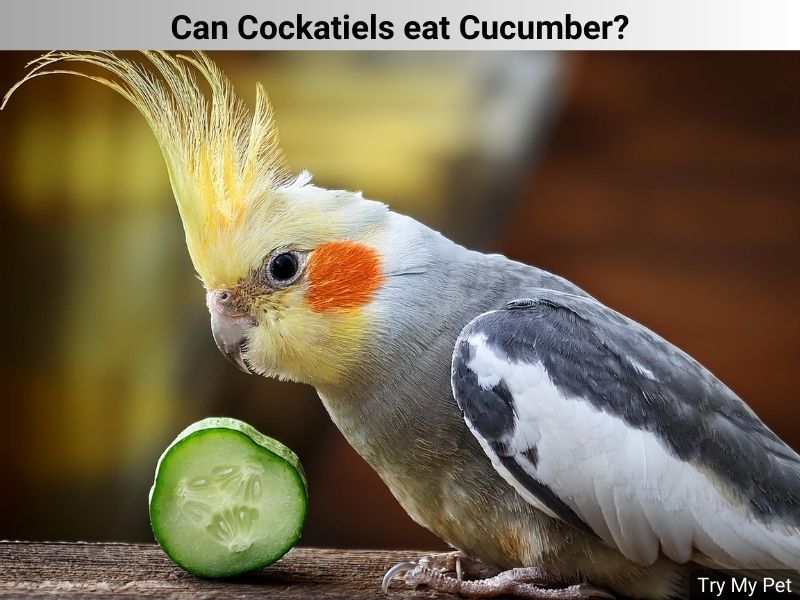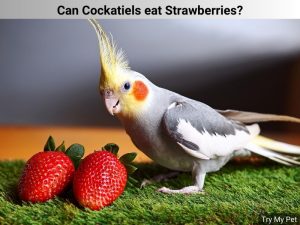Cockatiels are beloved pets known for their affectionate nature and delightful personalities. As a responsible bird owner, it’s essential to provide a balanced and nutritious diet for your feathered friend. One common question among cockatiel owners is whether cucumbers are safe for their birds to eat. This article will explore the nutritional benefits of cucumbers for cockatiels, potential risks, how to prepare cucumbers for your bird, and alternative vegetables that can be included in their diet. Cockatiels are small, social birds that thrive on a varied diet consisting of seeds, pellets, fruits, and vegetables. While seeds and pellets form the foundation of their diet, incorporating fresh produce can enhance their health and well-being. Among the plethora of fruits and vegetables available, cucumbers often pique the curiosity of cockatiel owners. But can cockatiels eat cucumber? The answer is yes, but there are some important considerations to keep in mind.
Nutritional Value of Cucumbers
Cucumbers are a refreshing vegetable that boasts a high water content, making them an excellent hydrating snack. Here are some key nutritional components of cucumbers:
1. Water Content
Cucumbers are composed of about 95% water, which can help keep your cockatiel hydrated, especially during hot weather. Hydration is crucial for maintaining overall health and can contribute to healthy feather growth.
2. Low in Calories
Cucumbers are low in calories, making them an ideal treat for cockatiels that may be prone to obesity. A diet too high in calories can lead to health issues, so offering cucumber as an occasional snack can help maintain a healthy weight.
3. Vitamins and Minerals
Cucumbers provide several essential vitamins and minerals, including:
- Vitamin K: Important for blood clotting and bone health.
- Vitamin C: An antioxidant that supports the immune system.
- Potassium: Helps regulate blood pressure and maintain proper muscle function.
While cucumbers are not the most nutrient-dense vegetable, they do provide some beneficial elements that can contribute to your cockatiel’s overall nutrition.
Benefits of Feeding Cucumbers to Cockatiels
Incorporating cucumbers into your cockatiel’s diet can offer several benefits:
Hydration
As mentioned, cucumbers have a high water content, which helps keep your cockatiel hydrated. This is particularly beneficial if your bird is not drinking enough water or if the weather is exceptionally warm.
Variety in Diet
Cockatiels thrive on variety in their diet. Offering different fruits and vegetables, including cucumbers, can prevent boredom and encourage healthy eating habits.
Encouragement of Natural Foraging Behavior
Feeding cucumbers in their natural form can stimulate your cockatiel’s natural foraging instincts. You can hang slices or chunks of cucumber in their cage, encouraging them to explore and interact with their food.
How to Prepare Cucumbers for Your Cockatiel
If you decide to treat your cockatiel to some cucumber, proper preparation is key. Here’s how to do it safely:
1. Wash Thoroughly
Before offering cucumber to your cockatiel, wash it thoroughly to remove any pesticides or contaminants. Organic cucumbers are a great option if you want to avoid chemicals altogether.
2. Remove the Skin (Optional)
While the skin of the cucumber is safe for cockatiels to eat, some owners prefer to remove it. If you choose to leave the skin on, ensure it is well-washed.
3. Cut into Appropriate Sizes
Cut the cucumber into small, manageable pieces that your cockatiel can easily handle. Slices or small chunks are ideal.
4. Serve Fresh
Always serve cucumbers fresh. Avoid offering any wilted or spoiled pieces, as these can lead to health issues.
Potential Risks of Feeding Cucumbers to Cockatiels
While cucumbers are generally safe for cockatiels, there are a few potential risks that owners should be aware of:
1. High Water Content
Excessive consumption of cucumbers can lead to diarrhea in cockatiels due to their high water content. It’s essential to offer this vegetable in moderation.
2. Pesticides
If not washed properly, cucumbers can carry pesticides that may be harmful to your bird. Always wash fruits and vegetables thoroughly before feeding them to your cockatiel.
3. Individual Sensitivities
Every cockatiel is different, and some may have sensitivities to certain foods. Monitor your bird for any signs of digestive upset or allergic reactions after introducing new foods.
How to Introduce Cucumbers to Your Cockatiel’s Diet
When introducing cucumbers or any new food to your cockatiel’s diet, it’s essential to do so gradually. Here’s how to do it:
1. Start Small
Begin by offering a small piece of cucumber to see how your cockatiel reacts. This will help you gauge their interest and tolerance.
2. Observe Reactions
Monitor your cockatiel for any adverse reactions, such as changes in behavior, droppings, or digestive issues. If everything seems fine, you can gradually increase the amount offered.
3. Mix with Other Foods
To encourage your cockatiel to try cucumber, consider mixing it with their favorite fruits or vegetables. This can make the cucumber more appealing and help your bird develop a taste for it.
Alternative Vegetables for Cockatiels
Cucumbers are just one of many vegetables that can be included in your cockatiel’s diet. Here are some other safe and nutritious options:
1. Carrots
Carrots are rich in beta-carotene, which is beneficial for your cockatiel’s vision and immune system. Serve them raw or lightly steamed for maximum nutrition.
2. Bell Peppers
Bell peppers, particularly red and yellow varieties, are high in vitamins A and C. They also add color and variety to your bird’s diet.
3. Broccoli
Broccoli is a nutrient powerhouse, providing vitamins A, C, and K, as well as calcium. Offer small florets to your cockatiel, either raw or steamed.
4. Spinach
Spinach is rich in iron and other essential nutrients. However, it should be offered in moderation due to its oxalate content, which can interfere with calcium absorption.
5. Zucchini
Similar to cucumbers, zucchini has a high water content and is low in calories. It’s another excellent option to keep your cockatiel hydrated and satisfied.
Conclusion
In conclusion, cockatiels can safely enjoy cucumbers as part of a balanced diet. With their high water content, low-calorie nature, and essential vitamins, cucumbers can be a refreshing treat for your feathered friend. However, it’s important to introduce this vegetable gradually and in moderation to avoid any digestive issues. Always wash cucumbers thoroughly to remove any pesticides and monitor your cockatiel for any adverse reactions.
By diversifying your cockatiel’s diet with a variety of fruits and vegetables, including cucumbers, you can help ensure they receive the nutrients they need for a healthy and happy life. Remember, a happy cockatiel is one that is well-fed and well-cared for, so don’t hesitate to experiment with different foods while keeping their health and safety in mind.
By adhering to the guidelines outlined in this article, you can confidently add cucumbers to your cockatiel’s diet, providing them with a tasty and nutritious treat they’ll enjoy!


